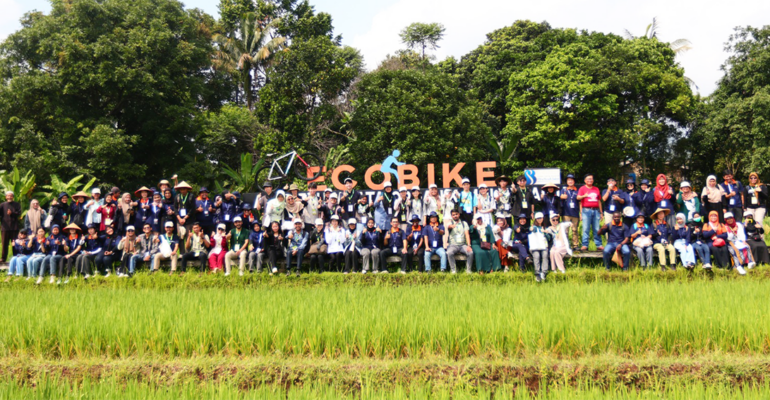SPs IPB University Invites Summer Course Participants to Visit AEWO Mulyaharja to Learn Agricultural Management in Bogor City

Participants of the 16th International Summer Course Programme on Tropical Agriculture and Environmental Management towards Regional Sustainability of the Graduate School (SPs) of IPB University visited Agro Edu Wisata Organik (AEWO) Mulyaharja Village, Bogor, (10/9). Programme participants came from various universities such as Ibaraki University, The University of the Ryukyus, and IPB University. The participants came from various countries, namely Indonesia, Japan, Uganda, Afghanistan, and China.
In this activity there were also participants from The 3rd International Summer Course on Natural Resources and Environmental Management Science (ISCoNREM) 2024. ISCoNREM activities are organised by the Study Programme (Prodi) Master of Natural Resources and Environmental Management Science (PSL) SPs IPB University.
Prof Titi Candra Sunarti, Vice Dean of SPs IPB University in the field of Resources, Cooperation and Development said that green open space (RTH) is very important as a city balance. She explained that RTH is not only landscaping, but can also be a productive space such as rice fields, gardens, and others that can be utilised for RTH.
“Productive spaces can be utilised for tourism that provides education to the community. How farmers and agriculture can produce the daily food we need, and how to appreciate farmers and agriculture is very important,” she said.
Prof Titi added that currently Bogor City is very developed. On the other hand, she said, the Bogor City Government also still maintains a number of areas for RTH in the form of rural atmosphere and organic rice fields. “If there is no government intervention, the rice fields will disappear. Therefore, it is important to preserve it, and it can even be used as an agrotourism model,” she added.
Prof Hadi Susilo Arifin, Chair of the ISCoNREM Programme, said that AEWO Mulyaharja is fully managed by the community. He mentioned that there is a lot of community participation, including the Mulyaharja Women Farmers Group (KWT).
“KWT has an important role in developing gardens to help balance the nutrition of the village community and also serve as an educational tool. Many students have come to this KWT to learn firsthand,” he added.
Meanwhile, Taufik Hidayat, Secretary of Mulyaharja Village, said that AEWO Mulyaharja has very interesting tourism potential. He explained, the distance from Mulyaharja Village to the centre of Bogor City is about 8 kilometres and the access is easy to reach.
“Apart from having rice fields and green land, the air conditions in Mulyaharja are very clean, pollution-free and kept clean. This atmosphere is certainly not found in the city,” he said.
Previously, participants were also invited to visit the hydroponic garden managed by KWT in Mulyaharja. Umyati, as the Chief of KWT Ciharashas Mulyaharja explained that this KWT was established in 2018 and has 34 members. The cultivation carried out by KWT members includes vegetables and urban farming.
“Currently, we get support from IPB University in developing the KWT garden. Here we have a garden tower, rain garden, and hydroponics. In addition to the outside marketing produced from this KWT garden, we also provide garden products for consumption and help with stunting problems in our area,” she explained. (HBL/ra) (IAAS/RUM)



